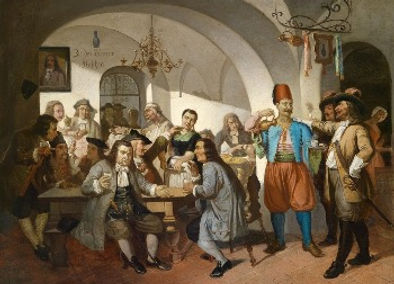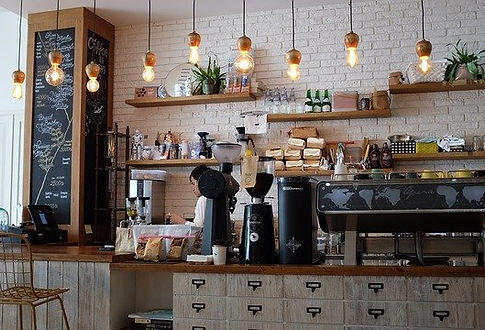.webp)
The Angel Coaching Inn.
In 1510 , “The Angel” tavern was established in what is today Oxfords' High Street. However, It wasn't until the mid 17th century did it come to prominence within in the city's culture..
The first English coffeehouse was established in 1651 at the Angel Coaching Inn by a Jewish entrepreneur named Jacob (at the time he was locally known as 'Jacob the Jew').
In the middle eastern countries like Turkey, coffee drinking was considered a leisure activity by the mid 1500's. In England however, It wasn't until the mid 17th century did the general perception of coffee consumption change from that of a 'medicinal' drink only, to a drink of leisure and culture.
Jacob was one of the first people to recognise this change occurring and thus established his first coffee house within 'The Angel Coaching Inn' and was considered the pioneer of Oxford's mid 17th century coffee house culture movement, and therefor, that of all England.

Oxford's coffee house culture became a place for "virtuosi" and "wits", rather than that of "plebes" who would frequent the city's taverns and spend most of their time drunk and engaged in all manner of fruitless conversation.
The coffee houses were a place for the educated and scholarly to debate scholastic matters and business, to garner news and information and to enjoy all manner of scholarly company.
However, there were no formal class or social status 'entry requirements' to enter a coffee house. One simply had to pay a 1 penny admission fee and then one would be free to enjoy coffee, conversation, news papers and the latest news being spread around the coffee houses by the 'runners' of the city.

A direct quote from ‘The Life and Times of Anthony Wood, Antiquary of Oxford 1632-1695' :-
“This year [1651] Jacob the Jew opened a coffey house at the Angel in the parish of S. Peter, in the East Oxon; and there it was by some, who delighted in noveltie, drank. When he left Oxon, he sold it in Old Southampton buildings in Holborne neare London, and was living in 1671.”

Some of the famous 'Virtuosi' who frequented the Oxford coffee culture scene included Christopher Wren, Peter Pett and Thomas Millington (and many many more).
There were physicians, master ship wrights, architects, scientists, poets and writers, professors, students and even the odd frequent of aristocracy. All engaging in all manner of interesting and scholastic or business conversation.

It is from this kind of clientele and the '1 penny admission fee' that many of Oxfords coffee houses thus earned the collective nick name of 'Penny Universities'.
Jacob succeeded in creating not just the concept of a coffee house, but mainly that of a place of culture and learning, without class prejudice and available to all, including those with little coin.
It was this winning formula that made Jacob's coffee house located within 'The Angel' so popular and successful, and as with all things successful, his formula was soon copied by many more entrepreneurs and Oxford's coffee house culture quickly expanded and spread to London.
A fellow named Pasqua Rosée had witnessed first hand the success of The Angel in Oxford and he soon set up his own coffee house in Oxford then travelled to London to expand further. In 1652, Pasqua opened his first London coffee house, located in St. Michael's Alley, Cornhill.
Many years later after creating financial success in London, Pascal Rosée moved to Paris where he opened the first coffee shop in the French Capital located in 'Place Saint-Germain'. The year was 1672.
Meanwhile across the pond, America saw it's first coffee house opening in Boston MA In 1676. (The Tontine Coffee house).
... and so it began.
.jpg)

In 1723 there were about 320 cafés in Paris. By 1790, there were over 1800.
By the late 1800's, In London alone there were an estimated 1,400 coffee houses with an estimated 4000 in all of England.
Italy saw a 'coffee revolution' occur during it's 18th century and saw many a coffee house opening within it's cities. In 1720 within the Italian city of Venice, the world renowned Cafe Florian first opened it's doors (and has been open ever since.. Almost).
America saw it's 'coffee revolution' begin shortly after The Boston Tea Party events of 1773. The revolt against King George the 3rd's 'Tea Tax' saw a mass switch from tea to coffee. The 1800's saw people like the Pittsburgh born Arbuckle brothers sell pre-roast coffee to the the cowboys of the west, James Folger started his coffee brand by selling it to the gold miners of California. Maxwell House and The Hills Brothers soon followed suit.
By the 1900's many coffee houses had morphed into the french style 'Café' and had proliferated into almost every town and city in the western hemisphere.

And then, in 1971, a little coffee shop called 'Starbucks' was founded by Jerry Baldwin,
Zev Siegl and Gordon Bowker at Seattle's Pike Place Market.
The rest, as they say, is history.
By 2025, it is estimated that the global coffee shop market will be worth around $237 Billion.
So, the next time you visit a café or coffee shop to enjoy a nice fresh cup of coffee,
remember the Angel Coaching Inn from 1651 and don't forget to say:
"Thank you Jacob".
















